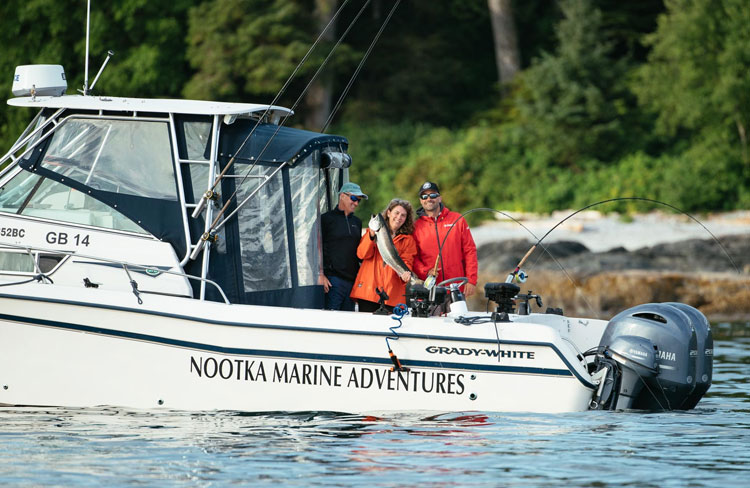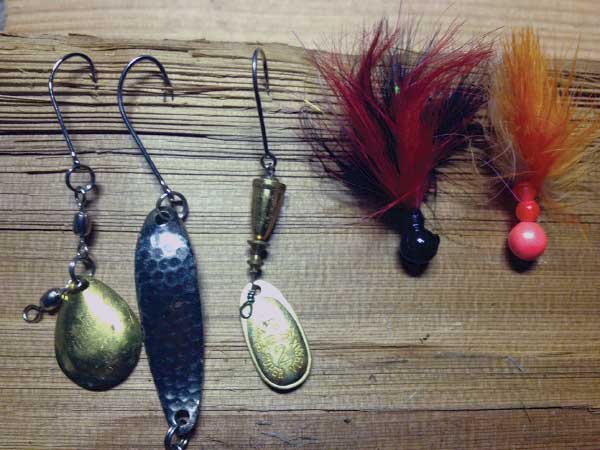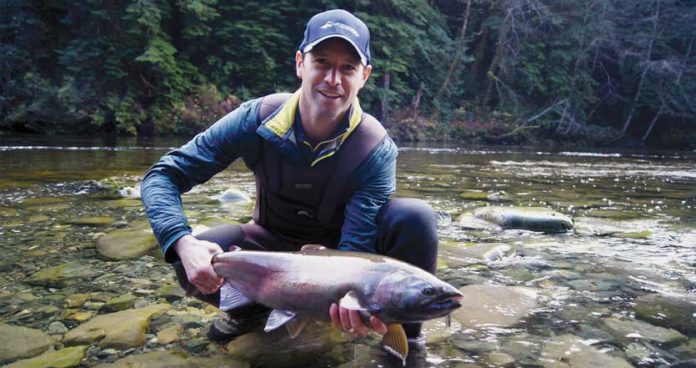When all the boats are gone the coho come out to play!
Nootka Sound is known for many things: the first place Captain James Cook landed in British Columbia, the home of the orphaned killer whale Luna, and, of course, stellar inshore and offshore salmon fishing. But it’s not known for what’s wrestling at the end of my rod.
It’s early November and I’m standing waist deep in the Conuma River, the most important salmon nursery in the sound, battling a crimson coho towards shore. It jumped four feet in the air, raced deep into a dark pool, fled downstream to use the current and now it’s charging straight at me. I furiously reel, my hand spinning like the Road Runner’s legs. Then, just as suddenly, my drag starts screaming as the doe goes for another run.
 Five minutes and several more back-and-forths later James Fisher, my guide for the day and the marketing consultant for Nootka Marine Adventures Ltd., manages to wrap his hand around her tail and pull the wild coho from the water. And then he does something that’s increasingly rare on Vancouver Island, he kills her.
Five minutes and several more back-and-forths later James Fisher, my guide for the day and the marketing consultant for Nootka Marine Adventures Ltd., manages to wrap his hand around her tail and pull the wild coho from the water. And then he does something that’s increasingly rare on Vancouver Island, he kills her.
“She’s perfect for the smoker,” he says, laying her on the riverside gravel. We’re both beaming from the excitement and natter away about the fight as we wade back into the river and start casting again.
The rivers fill with Chinook and chum and the coho start schooling near the river mouths waiting for their turn.
“There’s a lot of great fall fishing to be had in the ocean and the river,” says Fisher, as we toss weighted pink maribou jigs into a deep pool. “But no one seems to know about it.”
He starts to say more, but is interrupted with his rod tip diving towards the bottom. When he finishes fighting the biggest fish of the day, probably a 15-pound red buck, I have one follow my lure to within six feet of my rod before it snatches and runs.
In the first hour in the pool we land five fish and lose three. Then the almost non-stop action goes dead. “It happens with coho,” Fisher says. “We might have spooked them or something might have changed and they aren’t active anymore. Who knows.” I’m not complaining. I haven’t had this much action ever.
We decide to let them rest and hike five minutes through a stand of riverside old growth back to the truck. “Not bad for a morning of fishing,” I say, as we pull away. Fisher nods and then tells me the Conuma hatchery is hoping to make the coho fishery twice as good.
The hatchery is the only one feeding Nootka Sound. Releasing almost 2.5-million Chinook and 1.5-million chum fry every year, it’s a major reason for the sound’s reputation for dependable and consistent fishing. Right now it raises 150,000 coho eggs, but Moutcha Bay Resort would like to fund an increase to at least 300,000.
Not only will that improve late summer and early fall ocean fishing and then river fishing on the Conuma, but some of that will spill over to nearby rivers like the Leiner, says Gibran White, the marine operations manager for Nootka Marine Adventures, as he tours us to a few other pools. The Leiner and Conuma are two of six rivers within a 30-minute drive of our cabin at Moutcha Bay Resort with fall coho runs.
“Where else can you find that kind of concentration,” says White. “They’re all easy access with roads or trails beside them. It’s amazing.”
Even so, we seemed to have the whole sound to ourselves. While everyone knows about the Gold River, these ones remain off the radar. We’ve seen more bear and elk than other people; we haven’t seen another angler all day.
Later, back at our covered deck, we watch the rain pound the bay as we enjoy moose smokies, smoked salmon and beverage for dinner. White cleans the two coho we kept. I ask him about the two fish retention. “They have a commercial opening right out here,” he says, pointing to the waters between our deck and the estuary of the Conuma River. “They have to allow a corresponding recreational opportunity.” Two Chinook can be kept out of the river too.
The next morning, visions of buttery smoked coho dance in my head, as we creep down on elk trails to the Conuma. We can see the fish from shore – it didn’t rain enough to silt up the river. But their presence is a good sign I think.
“Wow,” says White, obviously disappointed. “There’s hardly any fish in here. Normally at this time of year, it would be black. There would be a couple thousand fish here.”
We’d heard the same thing the day before from the guys at the hatchery. This year’s run is disappointing and yet, at the tail end of the season, we had an epic morning yesterday. I start to imagine what the fishing will be like on a good year, especially if the Conuma Hatchery can up the output. I’m torn from the day dream with a tug.
From deep within the pool something shakes my rod. I watch my line zip away. I can see something sparkling beneath the surface. Then a coho takes to the air. Another Conuma coho has come out to play.
Resources
Where:
While the nearby Gold River may be the best known there are dozens of salmon bearing rivers and creeks emptying into Nootka Sound. The most concentrated area is between the Tlupana River and Tahsis. Access is via Gold River and then the dirt road to Tahsis. Most rivers are accessible from logging roads and riverside trails.
Where to stay:
Several free recreation site campgrounds are usually empty during the late summer and fall. There’s one right on the Conuma and another at a beautiful stretch of water on the Leiner.
A warmer, drier option is to rent a fully-equipped oceanside chalet at Moutcha Bay Resort. (nootkamarineadventures.com)
Fishing beta:
The best fishing coincides with higher water events when the coho become more active. The drainages are small in this rugged area, so immediately after big rain events is best. Try jigs in pink and purple as well as an assortment of spinners.







